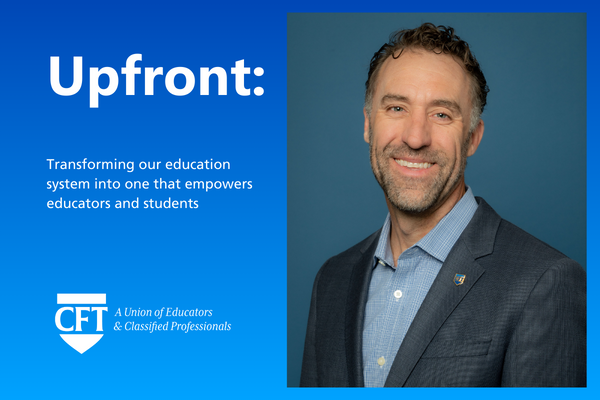This past August and September, I toured the state visiting as many locals as I could during CFT’s third annual Back to School Tour.
To me, it is important to talk directly with members who don’t often have the opportunity to come to CFT events and meetings. Each time, I gave a report, and then asked questions. I often asked our members: “if the Governor or President were here, what would you want them to know that you don’t think they know about your job?” Regardless of members’ job titles or positions in the education system, so many responses I heard echoed the same themes.
“My salary has not kept up with the high cost of living.”
“At this rate, I don’t ever see buying a house or living in the community where I work.”
“Healthcare cost has skyrocketed leaving so little in my paycheck.”
“There is too much paperwork and testing.”
“New teachers are overburdened with student debt and can’t make headway paying them off because of low wages.”
“I’ve worked here over 15 years and still am working part-time.”
“There are so few resources for special education: too few teachers, too many hurdles, not enough paraeducators.”
“There are too few student supports.”
Sentiments like these are not unique across the CFT membership. They are issues that cut across job titles, in both urban and rural settings, in public and private schools, in TK-12 and higher education. And this doesn’t even touch the attacks on academic freedom, microscopic oversight, and the culture wars being directed at our education system and educators.
Despite these challenges, when I ask members to tell me one thing that makes this job worth it, they all give the same answer: the students.
Every single person loves what they do, but they are burdened by systemic challenges that hinder their ability to provide the best education possible. This reality demands our attention and action.
As we reflect on these shared concerns, it’s evident that our mission to defend public education and education workers across all levels is more critical than ever. The issues of stagnant salaries in the face of a soaring cost of living, the housing crisis, excessive paperwork and testing, and the burden of student debt are not isolated incidents. They are interconnected threads in the fabric of our education system, affecting educators across the state.
Moreover, the plight of part-time educators after years of dedicated service and the glaring gaps in resources for special education underscore the urgent need for reform. The dearth of student support services only exacerbates the challenges our educators face daily.
Beyond these immediate concerns, we must also grapple with the encroachments on academic freedom and the divisive battles that threaten the very foundation of our education system. These issues, coupled with an educational regulatory environment that at times feels stifling, require our unwavering commitment to change.
In every conversation, one resounding truth echoes: the passion for teaching, the genuine love for nurturing young minds, is what drives each and every educator. The profound impact we have on our students’ lives is immeasurable, and it is this unwavering dedication that propels us forward.
As we move ahead, it is imperative that we stand united, ready to advocate for the changes our education workers desperately need. We must engage with policymakers, share our stories, and press for tangible solutions.
Together, we can create a future where we are supported, where the barriers to excellence are dismantled, and where our students receive the education they deserve.
The challenges we face are formidable, but they are not insurmountable. With steadfast determination and a collective voice, we can transform our education system into one that empowers both educators and students alike. Let us forge ahead, championing the cause of public education, knowing that our efforts today will shape a brighter tomorrow for all.
CFT President Jeffery M. Freitas


